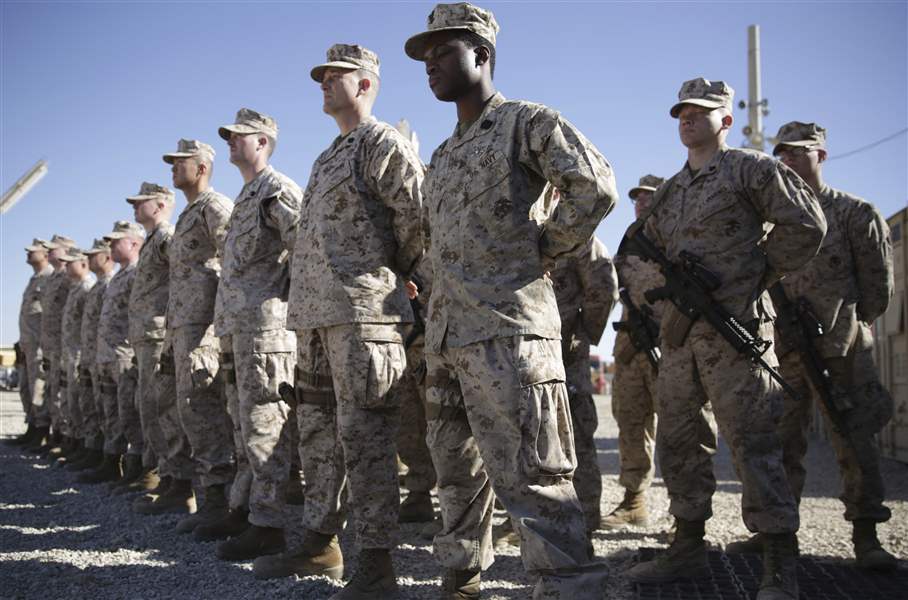
If Congress won’t provide oversight, citizens must take charge
7/6/2018
U.S. Marines stand guard during the change of command ceremony at Task Force Southwest military field in Shorab military camp of Helmand province, Afghanistan on Jan. 15.
ASSOCIATED PRESS

Will Tomer
How many countries can you name where the United States maintains a military presence? How many of these countries can your representatives in Congress name?
There are the well-known answers: Iraq and Afghanistan. Many would also identify Syria, Libya, and Yemen.
But what about Somalia? Or Kenya? How about the Philippines?
Would it surprise you to know that the U.S. military currently has a presence, related in many instances to counterterrorism, in at least 76 countries around the world?
According to Brown University’s Costs of War project, which tracked information about the United States’ “war on terror” between 2015 and 2017, that figure, however surprising it may seem, is correct. The U.S. military is operating in almost 40 percent of the planet’s countries.
U.S. drone or airstrikes occur in seven countries: Afghanistan, Iraq, Libya, Pakistan, Somalia, Syria, and Yemen. Combat troops operate in 15 countries, including Kenya, Qatar, and Turkey. The U.S. also maintains military bases in 44 different countries, and trains indigenous armies or local militias on counterterrorism tactics in 58 countries.
Many Americans are unaware of the extent of the war on terror. As it happens, at least some members of the U.S. Congress are unaware, too.
In the aftermath of an incident during which Islamic militants killed four U.S. soldiers in Niger in October, 2017, several U.S. senators claimed that they had not know the U.S. military was operating in Niger.
Senate Minority Leader Chuck Schumer (D., N.Y.), Sen. Bob Casey (D., Pa.), and Sen. Lindsey Graham (R., S.C.) all stated that they had been unaware of the U.S. military presence in the western African nation before the death of the soldiers.
There was evidence contradicting some of their claims — Mr. Graham, for instance, was in attendance for March, 2017, congressional testimony from U.S. Africa Command chief Gen. Thomas Waldhauser, who discussed U.S. counterterrorism operations in Niger.
But the fact remains that the size and scope of the “war on terror” has grown so significantly since it began in 2001 that it is reasonable to assume that Mr. Graham and his colleagues have lost track of how many countries in which the U.S. military conducts operations.
Perhaps more to the point, U.S. military operations abroad continue to expand. In President Donald Trump’s first year in office, U.S. special operations forces deployed to 149 countries, according to Military Times. That is up from deployments in 138 countries during President Barack Obama’s final year in office.
It seems likely, moreover, that the frequency and scope of these operations will continue to grow.

In February, Mr. Trump signed a bill which gave the Defense Department a $700 billion budget, its largest in history. That represents a 15.5-percent increase over the previous year, and plans are already in place that will allow the DOD budget to continue to grow at that rate in the years to come.
By comparison, China, the country that maintains the world’s second-largest defense budget, spends only $175 billion on defense.
How can U.S. citizens be sure that such vast amounts of money are being spent wisely when we know little or nothing about many of the conflicts in which the U.S. military is involved? How can Americans be certain that this money is well spent, if it might be better spent repairing crumbling infrastructure in the U.S. or improving the quality of our schools?
Arguing for public trust in the U.S. government’s ability to spend the defense budget money wisely, a trust which has declined precipitously over the last 50 years, is rendered even more difficult when prominent lawmakers tacitly acknowledge that they cannot keep track of all U.S. military operations.
Or when the Defense Department admits to problems in accounting for military personnel. Witness the 2017 story in the military newspaper Stars and Stripes reporting that the DOD lost track of 44,000 U.S. military personnel stationed around the world.
Why is the U.S. military operating in so many countries? Do the purposes and effectiveness of the operations justify their costs? To what extent is Congress exercising its oversight responsibilities? How much do the members of Congress need to know in order to do their duty?
These are among the many questions about current U.S. military operations and expenditures that demand answers. Americans have been taught to expect that their elected representatives will address such questions as a matter of course, but the evidence cited above suggests that this expectation is no longer realistic.
We must adopt a new vigilance in order to hold our government accountable; or, depending on your perspective, restore an old-fashioned watchfulness growing from abiding suspicions about government and politicians. Only then can U.S. citizens, armed with relevant knowledge and deserved skepticism, begin to make effective demands on the members of the House and Senate.
That is the tragedy of American democracy in the 21st century. What we know and don’t know about U.S. military operations epitomizes the alarming state of relations between American citizens and their government, relations that have been lately and commonly characterized by ignorance and indifference.
We can no longer count on our elected representatives to act in the interests of the people who sent them to Washington.
We can expect them to act in the interests of corporations and plutocrats that have underwritten their campaigns, and to respond cravenly when the needs of their financial backers conflict with those of their constituents.
We can expect them to squander public monies on an unprecedented scale when it suits their immediate political aims.
And we can expect them to distract and confuse their constituents when the attitudes of voters begin to coalesce in ways that might threaten the status quo.
The only way in which we can compel them to do their jobs is to be well informed on a wide variety of issues, exert real and consistent pressure, and send home the representatives that ignore the concerns of voters and the responsibilities of their offices.
What will it take? Better education in civics and government. Increased support of responsible journalism representing broad social and political spectra. And citizens who are willing to work, and work tirelessly, to preserve the democratic principles on which our government was founded.
In how many countries does the U.S. maintain a military presence? You know the answer. You will need to make sure that your representatives in Congress know it, too.
Nothing less will suffice.
Contact Will Tomer at wtomer@theblade.com, 419-724-6404, or on Twitter @WillTomer.